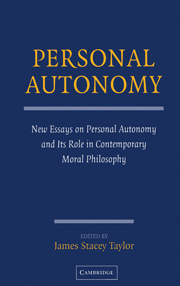Book contents
- Frontmatter
- Contents
- List of Contributors
- Acknowledgments
- Introduction
- PART I THEORETICAL APPROACHES TO PERSONAL AUTONOMY
- 1 Planning Agency, Autonomous Agency
- 2 Autonomy without Free Will
- 3 Autonomy and the Paradox of Self-Creation: Infinite Regresses, Finite Selves, and the Limits of Authenticity
- 4 Agnostic Autonomism Revisited
- 5 Feminist Intuitions and the Normative Substance of Autonomy
- 6 Autonomy and Personal Integration
- 7 Responsibility, Applied Ethics, and Complex Autonomy Theories
- PART II AUTONOMY, FREEDOM, AND MORAL RESPONSIBILITY
- PART III THE EXPANDING ROLE OF PERSONAL AUTONOMY
- Index
3 - Autonomy and the Paradox of Self-Creation: Infinite Regresses, Finite Selves, and the Limits of Authenticity
Published online by Cambridge University Press: 03 December 2009
- Frontmatter
- Contents
- List of Contributors
- Acknowledgments
- Introduction
- PART I THEORETICAL APPROACHES TO PERSONAL AUTONOMY
- 1 Planning Agency, Autonomous Agency
- 2 Autonomy without Free Will
- 3 Autonomy and the Paradox of Self-Creation: Infinite Regresses, Finite Selves, and the Limits of Authenticity
- 4 Agnostic Autonomism Revisited
- 5 Feminist Intuitions and the Normative Substance of Autonomy
- 6 Autonomy and Personal Integration
- 7 Responsibility, Applied Ethics, and Complex Autonomy Theories
- PART II AUTONOMY, FREEDOM, AND MORAL RESPONSIBILITY
- PART III THE EXPANDING ROLE OF PERSONAL AUTONOMY
- Index
Summary
INTRODUCTION
The political state of autonomy has proven to be a compelling metaphor for the condition in which a person is under his or her own control, master of his or her own destiny. The political metaphor suggests that personal autonomy is a condition in which one is not ruled over by external forces. However, there is another dimension to personal autonomy. This is the idea of government by the legitimate authority. A usurper takes power from within the state, rather than conquering it from the outside. Likewise, psychological forces can usurp power from a person. Just as a person can lose control to external forces such as coercion or peer pressure, so, too, can s/he lose control to internal forces.
Apparent examples of internal forces that may threaten to usurp control from its rightful locus include addictions, obsessive-compulsive disorder, pathological gambling, kleptomania, and strong phobias. For those who prefer more-fanciful examples, the philosophical literature on autonomy also includes scenarios involving desires implanted through psychological conditioning, hypnosis, brain washing, futuristic psychosurgery, and(that old favorite) super natural intervention. Such forces may seem “alien” or “ego dystonic” because they do not issue from the person's goals, values, and beliefs. Although they come from inside her own head, so to speak, they are not experienced as being part of “who she really is.” She seems to be the victim whom they afflict rather than their author. This sense of affliction or alienation is often expressed in more everyday language by a certain special use of the term “self.”
- Type
- Chapter
- Information
- Personal AutonomyNew Essays on Personal Autonomy and its Role in Contemporary Moral Philosophy, pp. 87 - 108Publisher: Cambridge University PressPrint publication year: 2005
- 29
- Cited by



